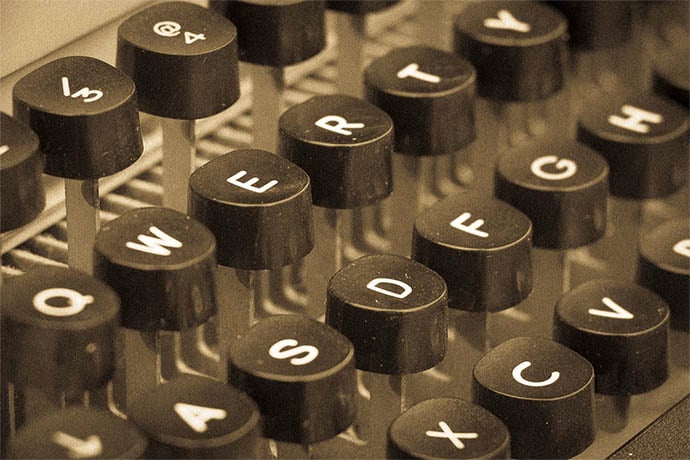Computer keyboards were created only when the traditional way to input data into a computer — punch cards and paper tape — became obsolete. While they use the keys from a typewriter, computer keyboards evolved from teleprinters.
If you think about it, typewriters are a natural extension of the printing press. In 1575, an Italian printmaker Francesco Rampazzetto created a machine to impress individual letters on paper. In 1714, Henry Mill in Britain patented a machine to type letters on paper. In the early 1800s, several Italian inventors created versions of a typewriter. One inventor, Agostino Fantoni, built his typewriter to enable his blind sister to write. Modern typewriters were invented and mass produced from the 1860s onwards.
Computer keyboards descend directly from teletypes or teleprinters, devices that could send and receive messages from one teleprinter to another or to many teleprinters. These devices used dedicated telephone circuits, switched networks like the phone company, radio waves, and microwaves. Teleprinters also used modems to connect to computers through telephone lines. And they were used to generate punch cards and paper tape for computers to process.
Teleprinters did much more than typewriters. They also could produce computer codes and be controlled by computer codes.
Today teleprinters have been replaced by computers and keyboards which do many things. In software specifications, you still might see TTY which is shorthand for teletypewriter, another name for teleprinters.
Typewriter and computer keyboard layouts also have their own history. Most keyboards use QWERTY layout. But there are other layouts, for example, Dvorak and Colemak. And keyboards found in non-English speaking countries use QWERTY as their start point, changing keys and key combinations to print letters and characters unique to their language.
The image below, from the current issue, presents this story as text and images. Right mouse-click the image to open it in a new tab and see it full size. Or download the PDF file.

Learn More
Computer Keyboard
https://en.wikipedia.org/wiki/Computer_keyboard
http://www.daskeyboard.com/blog/typing-through-time-the-history-of-the-keyboard/
http://history-computer.com/ModernComputer/Basis/keyboard.html
Typewriter
https://en.wikipedia.org/wiki/Typewriter
Teleprinter
https://en.wikipedia.org/wiki/Teleprinter
QWERTY
https://en.wikipedia.org/wiki/QWERTY
Non-QWERTY Keyboard Layouts
http://mentalfloss.com/article/52483/6-non-qwerty-keyboard-layouts
https://en.wikipedia.org/wiki/Dvorak_Simplified_Keyboard
https://en.wikipedia.org/wiki/Maltron
http://www.makeuseof.com/tag/a-history-of-keyboard-layouts-is-qwerty-lagging-behind/
Projection Keyboards
https://en.wikipedia.org/wiki/Projection_keyboard
Hansen Writing Ball
https://en.wikipedia.org/wiki/Hansen_Writing_Ball
Simplex Typewriter
http://oztypewriter.blogspot.com/2012/06/simplex-typewriter-glorious-simplicity.html
https://www.youtube.com/watch?v=VhdZP16d9Uo
http://www.typewritermuseum.org/collection/index.php3?machine=simplex&cat=ic

